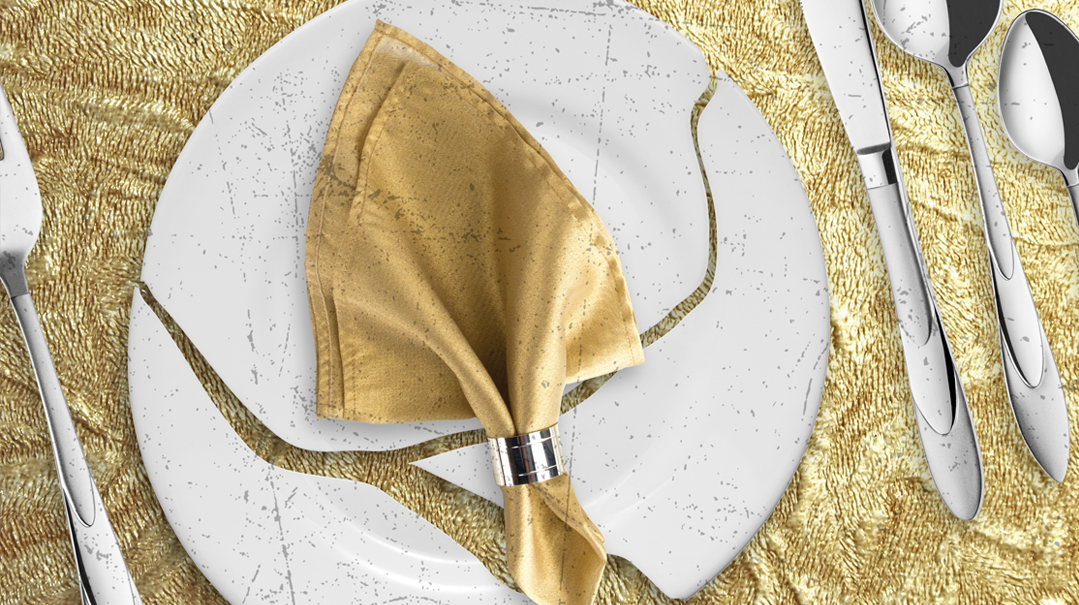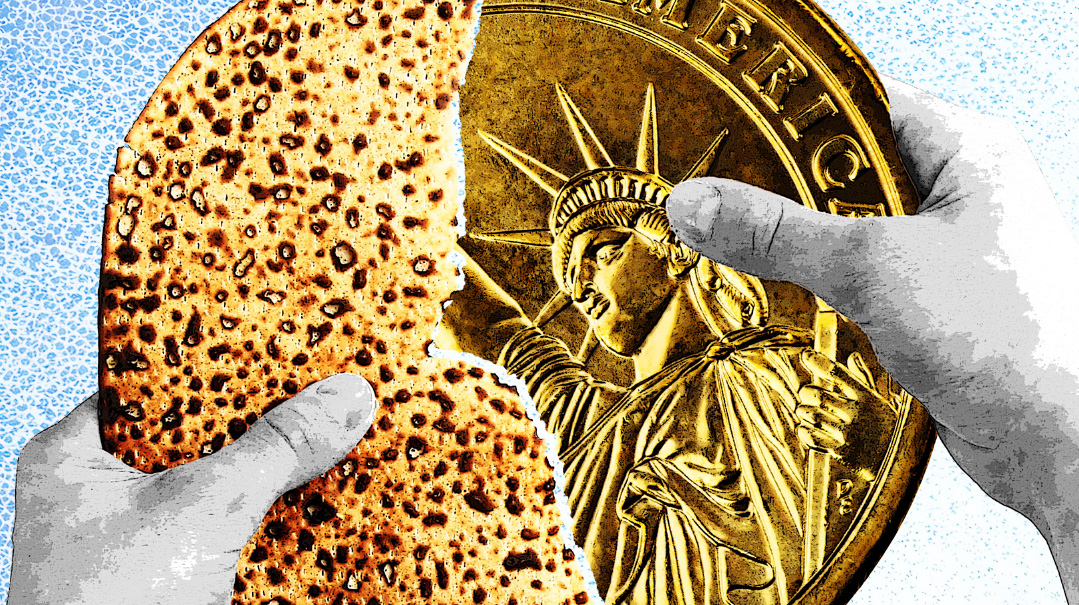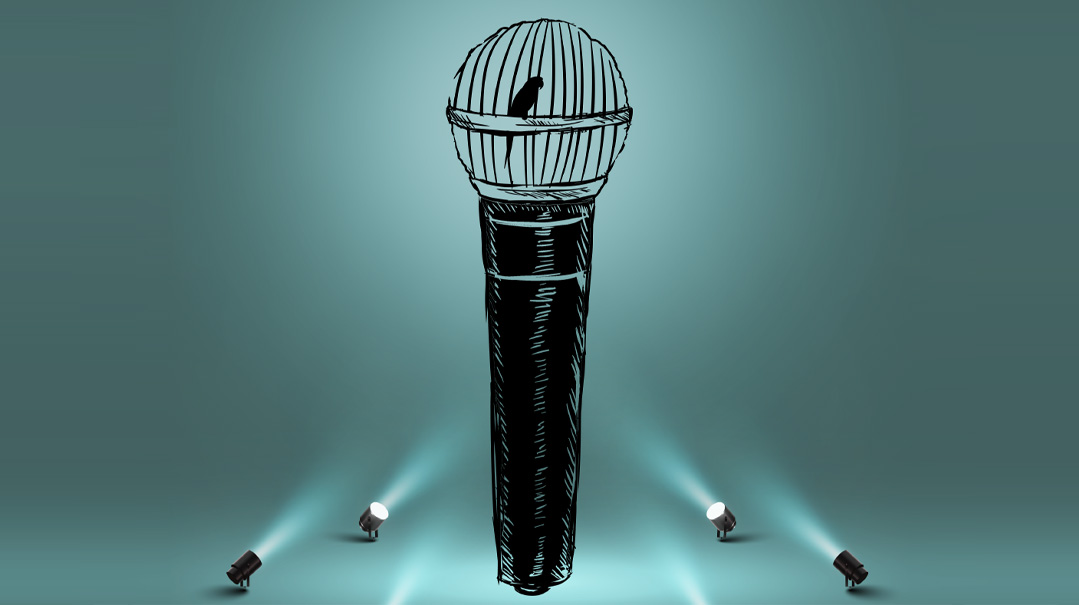Special Circumstances
| August 10, 2021"She’s a very sweet kid.” But our family isn’t used to this. We didn’t have any warning, and the children were frightened

Gila: Shabbos sheva brachos is not the time to start special-needs education.
Rikki: Can’t you teach your kids about accepting those who are different from them?
Rikki
"Rikki Morgenfeld, you are so unbelievably organized, it’s embarrassing.”
Dina, my colleague and close friend, closed the binder and sat back in her chair. We were going through the material I’d prepared for the classes I’d be missing over the next few days. My husband’s youngest brother was getting married, and the kallah lived out of town.
“Tell me you don’t do this every week when you prepare your classes?”
“Nah.” I waved a hand, and the top few papers from a stack of photocopied sheets fluttered to the floor. “Whoops! Anyway, no, this is in honor of the occasion. I’m taking a full week off, and Mrs. Berger wasn’t so pleased. She wanted me to find substitutes for every single class, from within the staff, so the girls wouldn’t lose out on valuable learning time... you know how it goes. Thanks for taking my parshah classes, by the way.”
“With everything you’ve prepared, it’s really no big deal,” Dina said. “So you’re off tomorrow? For the week?”
“Yup. Chasunah is on Thursday, then there’s Shabbos sheva brachos in some fancy hotel. Her side has money. My kids are so excited, you have no idea. And I’ll be excited once I’ve given over this boatload of lesson-planning material and we’re actually on the way... it’s been crazy.”
“I’m sure,” Dina murmured. “Dresses, suits, shoes, hair and makeup appointments... I know how it goes.”
“Yup. And everything with Toby takes about ten times as long as the others... first the dress we chose bothered her, and then there’s the hassle of taking her shopping, every single time, for shoes and accessories... and of course she wants her hair and makeup done like the others... but the main thing is, she’s super excited. We haven’t had a wedding in the family for a while, and she’s been talking about it for weeks. Nonstop.”
When I said nonstop, I meant it literally. Toby, my oldest daughter, has high-functioning, “invisible” special needs. Which means that although she looks like a typical 12-year-old girl, her behaviors are decidedly atypical. And when Toby is fixated on a subject, it’s all that we (and her siblings, and teachers, and day camp counselors, and everyone) hear about for weeks.
“Awww, she’s going to have a great time with the cousins,” Dina said. Our families were close, and she had Toby over at her house all the time. “What a party!”
I thought about the stuff I still had to organize and the long car journey (Toby hated traveling). “Yeah. It’ll be worth it once we’re there,” I said.
The wedding really was beautiful. Adina, Yossi’s kallah, looked like a princess, and Toby couldn’t get over her gown. I had to keep reminding her that the kallah’s gown was not for touching, but Adina was gracious and understanding. She even took Toby into the middle for a private dance together. My daughter beamed for about an hour afterward.
I enjoyed spending time with my sisters-in-law, but to be honest, I didn’t have that much time to relax. Aside from my younger girls, who needed attention every other minute, Toby was overtired and overstimulated and I really hoped that she wouldn’t have a meltdown before the end of the dinner.
“Mommy,” said my seven-year-old daughter, Simi, sidling over after the main course was served. “Toby’s bothering the cousins.”
“Our cousins?” I was surprised; my nieces all know Toby well, and they usually interact fine with her, using a firm tone to tell her that they didn’t want to be touched, but always trying to include and play with her. “Who?”
“The cousins on the kallah’s side,” Simi whispered. “Toby was trying to touch their up-dos and they got all upset and one started to cry and they called their mother…”
I looked back at the “cousins table,” where there seemed to be some sort of scene going on around a woman with a long, dusky pink gown. Kids were clamoring for her attention. I couldn’t see Toby. Was she in the center? Blocked from view? Become overstimulated and walked off somewhere? This woman, probably Adina’s sister, had no idea of Toby’s special needs. She was probably trying to reason or argue with her. I face-palmed myself. Ouch.
“Thanks for calling me, Simi.”
Toby was sitting on the floor, her eyes huge. My younger girls, Nechama and Batsheva, were standing beside her, looking protective, with several of my nieces hanging around. A gaggle of the kallah’s nieces were gathered behind the woman in pink.
“Oh — you’re her mother?” Adina’s sister asked me. “I need to speak to you.”
But I had eyes only for Toby, who looked like she was about three seconds away from a meltdown.
“Just a minute,” I told her. I crouched by my daughter. “Toby, Mommy’s here. Wanna tell me what happened?”
“Your daughter has been frightening my girls,” Mrs. Pink Gown sniffed, from behind.
“She can’t help it!” Nechama said, loudly. “We told them that it’s not her fault! She doesn’t know, like, social skills and stuff, okay?”
Nechama is nine years old. Only a sib of a special child would say something like that. I had to smile.
“It’s true,” I said, once Toby was finally sitting back at the table. “She really doesn’t know better. Listen, Toby’s sisters and cousins are gonna be right here to help her have a great time without making anyone feel uncomfortable. But if she says or does anything that seems funny, you’ll know she can’t help it. It’s how Hashem made her.”
Mrs. Pink Gown was standing behind her daughters’ chairs, one arm on her youngest girl’s shoulder. She didn’t look too happy, but I honestly didn’t see why. It wasn’t as if I’d asked her girls to help out. They were sitting at the other end of the table, for goodness’ sake.
“We’ll look after Toby, Mommy, don’t worry,” Nechama promised, and her sisters and cousins chimed in their agreement.
“All right, Toby? So many friends you’ve got, right?”
She seemed much calmer now. I returned to my table with a sigh of relief. Crisis averted.
Or so I thought.
The phone call came around midday, but we were only just waking up. It was the morning after the chasunah, it had been a beautiful simchah, beginning to end. Everyone had come home exhausted, except for Toby, who’d reacted to the drastic change in schedule by running around our host’s house in her stained gown and refusing to change or go to bed. By the time we collapsed into bed, it was almost morning.
I woke up late. The kids were playing downstairs, and our wonderful hostess had Toby “helping her prepare for Shabbos,” letting Toby talk at top speed while she passed a potato from hand to hand, distracted.
“And I had a dress and my mother bought it from the shop and I had a special dress and it was brand-new from the shop…”
“I’m sure you looked beautiful,” Mrs. Zeiger, our hostess, told her. Then she caught sight of me. “How are you? Can I offer you something to eat or drink?”
I accepted a cup of coffee gratefully, and checked my phone. We were supposed to be leaving soon for this hotel. There was a missed call, from an unfamiliar number. Even as I frowned over it, wondering who it could be, the phone rang again.
“Hi, Rikki? This is Gila Feldman, Adina’s mother.”
The mechuteneste!
“Hi! Mazel tov. What a beautiful chasunah… can I help you with anything?”
“Well, actually, yes, you can,” Adina’s mother said. I thought I could discern a bit of discomfort in her voice. What was going on? They’d double-booked our rooms? Had a mishap with the hotel?
“It’s about your daughter. Toby, I think?” she continued, without pausing for breath. “I— listen, she’s very sweet, and I don’t mean to hurt anyone’s feelings or anything. It’s just that, you know, my daughters tell me — she made the children a little uncomfortable last night. Yossi and Adina explained to me what it is, the background, you know, and of course, we’d love for her to be involved in the simchah as much as possible.”
Mrs. Feldman was talking very fast. She didn’t leave any room for me to reply, not that there was anything I had to say. My mouth was literally open from shock.
“So we discussed it, my husband and I, and we wanted to run this by you, just, you know, so that everyone is comfortable. I know that originally we had all the granddaughters from both sides sitting together, you know, like at the chasunah, so that the girls could enjoy themselves together with others in the same age group. But with what happened last night, we think it would be best if Toby sat with you at the adults’ table. Just so that it’s comfortable for everyone.”
She came to the end of her monologue, and finally, blessedly, paused for breath. “I hope — you know, that that’s all okay with you. And that maybe you — or your husband — could make sure to be with Toby over Shabbos… during the day… some of the kids were very frightened last night. It would be reassuring for them to know that you would be around to make sure that nothing happens.”
There were so many thoughts and emotions running through my mind, I literally didn’t know what to say first. But primarily, I was hurt — and furious.
“Toby might be a little different to your granddaughters, but she has feelings, too,” I said, finally. “She’s 12 years old, and she wants to sit with the younger girls, not with the aunts at the adults table. She’s been looking forward to this Shabbos for weeks. She gets along with her sisters and her cousins, and I’m sure she would love to be friends with your granddaughters too. Why don’t they try get to know her a little?”
Gila Feldman took a deep breath. “Listen, Rikki, I understand, and I feel for Toby, too,” she said. “But the children… they were scared last night, I don’t think it’s the right time to ask them to befriend Toby. You know, some of them felt that they’d rather stay home for Shabbos if — you know, if the same thing would happen again. This is just better for everyone.”
If I could tell Gila one thing, it would be: Toby is a part of the family, and a part of the simchah, just like everyone else. How can you exclude her from the fun because of her challenges?
Gila
The kids’ table was supposed to be the easy part.
The adult tables, now those were complicated. Would my second cousin Blima prefer to be at the family table with the great-aunts, or the friends table with no one she knew? Would my colleague Bracha rather sit with her sister, who was a neighbor of the chassan, or with the other work friends? What about her sister, who didn’t really know anyone besides the chassan’s mother, maybe I should put her at the work table to be with Bracha? But then, wouldn’t that make her feel awkward and out of place?
At least the immediate family was simple: chassan’s side at one table, kallah’s at another, and a dozen or so nieces from both families at the kids’ table to one side.
Or it should have been simple.
I’d noticed at the vort that one of Yossi’s nieces seemed a little… immature for her age. She was what, ten? Eleven? Older? But she’d been speaking too loudly, laughing too often, and I noticed that the mother always seemed to be busy with her, even though there were lots of younger children, too. But honestly, the family had left early — they were driving back home that night — and I hadn’t really given the matter too much thought after that.
The chuppah was beautiful, Adina glowed, and I felt the tension of the weeks of preparation slip away in a rush of nachas and joy. The glass smashed; the couple was danced away in a blur of people, music, happiness; there was yichud and pictures and well-wishers and finally, the chasunah dinner was underway. The guests were seated — everyone seemed more or less happy with the arrangements, thankfully — and soft music played as the waiters served cream of chicken soup.
“Ma, can I speak to you a minute?” my daughter Shevy murmured confidentially into my ear. She glanced briefly at my new mechuteneste, Yossi’ mother. “Um, maybe let’s just step outside a moment?”
Adina was giggling over something with Yossi; she didn’t even notice me leave the table.
“What’s going on?”
Bracha, my youngest married daughter, joined us, too. She was holding her little Ayala’s hand tightly.
“It’s one of Yossi’s nieces, you know, the big one with the hairstyle that’s half coming down?” She pointed across to the kids’ table, where one girl sat alone at one side of the table. “I don’t know what’s with her, but she’s been upsetting the kids… telling them their dresses aren’t pretty and their hair isn’t fancy. Some of the kids got scared… Ayala won’t sit at the table anymore.”
My granddaughter sniffled. “She breathed onto my plate. And she tried to touch my food with her fingers. And it’s germs!” She looked disgusted. Our little madam. I couldn’t help but smile.
“Don’t worry, Ayala, I’ll ask the waiter to get you a new portion.”
Then I turned to Shevy. “Why don’t we just speak to the mother? Yossi’s sister-in-law.”
Shevy snorted and waved a hand. “She came over while I was trying to speak to the kid — Toby, she’s called. I tried telling her that Toby was bothering our girls, but she really wasn’t — I mean, not to say lashon hara or anything, but I don’t think she gets it. She’s used to her daughter, so she thinks it’s no big deal to touch other kids, make fun of them, or bother them, breathe in their face, stick hands in their food. Our girls — they’re just not used to that. And she gave this whole spiel that ‘this is how Hashem made her,’ but honestly, it’s not okay to put your special-needs child at a table with other children who have no idea how to handle it.”
I took a deep breath. I agreed with Shevy, but this was done, it was time for damage control.
“Let’s make this work,” I said. “It’s Adina and Yossi’s night, let’s not ruin it. Toby has her sisters and her own cousins there, tell your girls to stick together, and play their other cousins. They can sit at the other end of the table. It’s only a couple more hours, and soon we’ll be dancing again. Do you think they can manage?”
“Ayala’s staying with me. I’ll bring an extra chair to our table,” Bracha said, putting a protective arm around her daughter.
Shevy pursed her lips. “I’ll see how it goes. I don’t want to make anyone uncomfortable, but my girls really were upset.”
We made it through the rest of the chasunah, not without some more comments from my daughters and daughters-in-law. I looked over at the kids’ table by dessert; it was noticeably empty of “our side.” I looked over at where Shevy and Bracha were sitting, together with my daughters-in-law and my sisters. Extra chairs were jammed around the table and my young granddaughters were sitting with their mothers. It worked, but I was frustrated. There was a kids’ table for a reason; I’d taken the time to work on the children’s menu options, and even now a confused waiter was bringing half of the parve vanilla sprinkle cones back to the kitchen.
Small problems, I reminded myself, and turned my attention back to Adina.
“Ma, we need to do something.”
It was eight in the morning, the day after the chasunah. I felt like I’d barely hit the pillow two hours ago.
“Huh? What is it?”
Even through the haze of exhaustion, I recognized Shevy’s voice: clipped, pressurized, tense.
“We need to do something,” she repeated. “I don’t know what to tell them. They’re literally refusing to come.”
“Come where?” My hand closes around my glasses and I sit up, blinking the world back into focus. “And who’s refusing to come?”
“My kids! To the hotel! They don’t want to come for Shabbos because they’ll be sitting with… you know, the kid from the chassan’s side. The special-needs daughter. I think my kids were a little traumatized.”
Coffee. I needed coffee. “Traumatized? Don’t you think that’s a little… extreme?”
Shevy spoke fast and quietly, like she was trying to get the words out before her kids found her. “Listen, Ma, my kids have literally never encountered special-needs children before. They were scared, it sounded like she was teasing them, making fun of their hair and makeup. And she kept touching them, their plates, she has no social skills. You know how finicky Bracha’s Ayala is. My girls also didn’t like it, she got Sara’s dress a little dirty, you know… we did our best last night, we didn’t want to ruin anything for the chassan and kallah, but now, a whole Shabbos — we gotta do something about it.”
“Do what?” By now, I was fully awake. “I can’t not ask them not to come to the sheva brachos. Imagine how hurt they would be! And besides, it’s Yossi’s family.”
“I know that,” Shevy said. “But I think we can ask them to have Toby sit with her mother for all the meals, not with the kids.”
“Maybe we can just sit the nieces on Yossi’s side at a different table than ours?” I suggested. I didn’t feel so comfortable about setting rules for Toby’s parents.
“Nah, it won’t work, she could just come over to them and start bothering them again,” Shevy said. “Listen, I would sit at the kids’ table, but I don’t think it’ll help, I don’t have any clue what to do with Toby. She doesn’t listen to me. Maybe at their family events, everyone’s used to her and it doesn’t bother them, but I think her mother should understand that here we’re not all familiar with her daughter and how to handle her — certainly not the little kids!”
“I hear you,” I said. Shevy was right. I just wished she wasn’t.
I procrastinated making the call for a while. There was so much to do and arrange for Shabbos, it was easier to put the whole Toby situation out of my mind. But Bracha sent me a long text with her opinion — apparently, she and Shevy had planned this together — and my daughter-in-law Michal called me, of her own volition, clearly highly uncomfortable.
“I really don’t know how to say this, Ma, and I feel so bad,” she began. “It’s about that girl, one of Yossi’s nieces… Sari keeps on telling me that she’s scared of her. Apparently she shouted at the kids, and said these strange things… I explained to Sari that she can’t help it and this is how Hashem created her, but I don’t know, I’m a little worried about Shabbos. Sari and Esty are really not happy about sitting at the cousins’ table. Maybe I could just have them sit with me?”
I appreciated that she wasn’t asking me to seat Toby somewhere else, but by now I was fully with Shevy. We couldn’t have everyone else on tiptoes, trying to keep their kids happy by squeezing them in with the adults. I had to speak to Toby’s mother and explain the situation, ask her to make sure her daughter was with a parent over Shabbos so the kids could be reassured that they wouldn’t be frightened or picked on by an older child who looked like a regular kid her age. It was too hard to explain to four-, five-, six-year-olds the concept of invisible special needs, and that Toby was harmless and wouldn’t hurt them. Besides, she’d touched them, messed with their food, stained someone’s dress. You couldn’t exactly call that harmless.
Of course, Rikki — Toby’s mother — wasn’t happy. Maybe that’s an understatement. “Toby might be different, but she has feelings, too!” she protested, when I’d finally placed the call. “She wants to sit with her cousins, the younger girls, the kids her age… not with the aunts at the adults table. She’s been looking forward to this for weeks, you know.”
“I know, and I really understand,” I started to say, but Rikki was still talking.
“Toby gets along with her sisters and her cousins, and I’m sure she would love to be friends with your granddaughters too. Why don’t they try get to know her a little?”
I tried explaining to her the situation; that the girls had been scared, they hadn’t had advance warning, and we were trying to remedy the situation in time for Shabbos.
“This is really about Yossi and Adina, we want them to enjoy their special Shabbos, and they would be really devastated if any of their siblings or nieces and nephews weren’t there,” I told her. “My granddaughters were really upset last night. It’s wonderful to educate them to respect everyone and be friends even with people who are a little different, but now is the wrong time for that — we’re kind of in damage control mode. You know what I mean?” I said, trying for a lighter tone. “We just want to make this work, show them that Toby isn’t going to hurt them or scare them… I think they’ll feel more reassured if Toby’s with you. You never know, maybe over Shabbos they’ll warm up, and get to know her better.”
That would really be best, I thought. Start off with Toby safely with her mother, and then slowly the kids would see that she really wasn’t going to do anything to them. They’d get used to her behavior and maybe be a bit more open to making friends. We could even try and have her sit with the cousins by Shalosh Seudos again.
“I hear you, Mrs. Feldman, but this really isn’t taking into account Toby herself,” Rikki Morgenfeld said stiffly. “She’s a sensitive girl, and she hates being excluded. It isn’t fair to punish her because she’s different.”
“Chas v’shalom! We’re not punishing anyone,” I said, my voice rising. My husband, Sholom, poked his head in from the other room, raising an inquiring eyebrow. I gestured to him, frantically. What should I say? “It’s just that this seems to be the only option, that we can have everyone attend the sheva brachos comfortably. And we’re not excluding her at all. We’d just asking for you or your husband to be with her all the time. She can even be wherever the kids are, as long as there’s, you know, some supervision so that the children who aren’t used to handling her needs feel reassured.”
I was happy with that explanation. She wasn’t.
“How about if I speak to the kids myself?” Rikki asked. “I want to explain to them a little about Toby’s needs… I mean, if I had known that it would be such a problem, I would’ve done it before, but honestly? We’ve never had a problem with Toby being with the other kids at our family simchahs. The cousins all love her. They have so much fun together.”
“I’m sure they do. She’s a very sweet kid.” But our family isn’t used to this. We didn’t have any warning, and the children were frightened.
“So I’ll do that.” Rikki’s voice brightened. “I’ll speak to them, and maybe your daughters can speak with them too. Let’s use the opportunity to teach the kids about handling special needs and differences. We could also — maybe your daughters could, you know, model it. By acting friendly to Toby and speaking to her and firmly telling her that she can’t touch them, but they can sit and talk together… you know, show the kids how to do it. It’s a great skill for children to have, the ability to interact with people who are a little different from them, without running away.”
I sighed. She was so eager and passionate, and this was such a sensitive topic. But—
“I don’t think we have the time for that,” I said, trying to keep my tone gentle. “It’s the middle of the simchah, and we just have to make this work. We need the kids to get over feeling scared and upset, before we start teaching them about middos.”
I felt so bad for Rikki, and for Toby too. Because it was true: There could have been time for educating the children about how to interact with and befriend Toby. But now, it was just too late — the damage was done.
If I could tell Rikki one thing, it would be: I feel for you and your daughter, but as the baalas simchah, I have to ensure the comfort of all of my guests.
(Originally featured in Mishpacha, Issue 873)
Oops! We could not locate your form.







